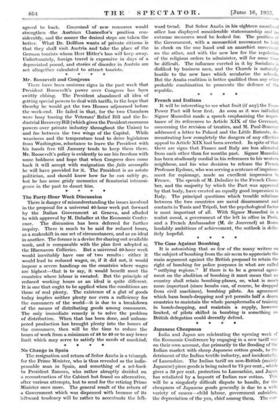Japanese Cheapness India and Japan are celebrating the opening week
of the Economic Conference 'by engaging in a new tariff war on their own account, due primarily to the flooding of the Indian market with cheap Japanese cotton goods, to the detriment of the Indian textile industry, and incidentally, of Lancashire. The Indian tariff on non-British (mainly Japanese) piece goods is being raised to 75 per cent., which gives a 50 per cent. protection to Lancashire, and Japan has retaliated by a boycott of Indian raw cotton. This will be a singularly difficult dispute to handle, for the cheapness of Japanese goods generally is due to a wide variety of causes—child labour, government subsidies, the depreciation of the yen, chief among them. The cur- rency depreciation will tell the other way from now on,. when new supplies of raw material have: to be bought— this year's were acquired while the yen was still on gold— but the menace of cheap Japanese products in the Indian and other markets will remain. The Japanese, itis fair to recognize, claim thatcheapnesS is largely due to superior factory organization and equipment. So far as it is the result simply of low standards of living the right of other countries to defend their own standards must be admitted. But there is -room in this case for discussion and perhaps for accommodation.











































 Previous page
Previous page